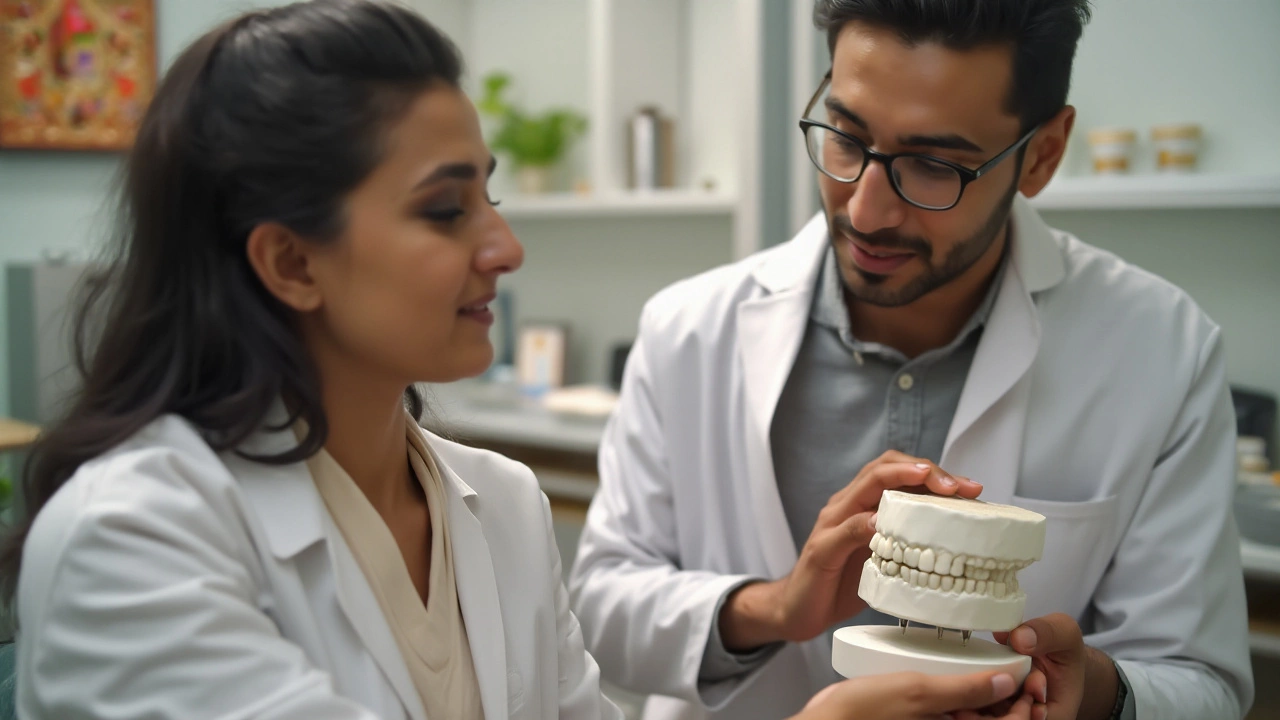
In today's world, dental implants have become synonymous with innovation in oral health solutions, offering a robust and lasting choice over traditional dentures or bridges. Yet, beneath their technical brilliance lies a world filled with insights and nuances that often go unnoticed.
This article explores those unexpected gems of knowledge—information that might not make it into the glossy pamphlets but is invaluable to those considering implants. Here, beauty isn't just about that sparkling smile; it's about feeling informed and ready to make a choice that will last a lifetime. Whether you're weighing options or already on the path, these insights might just illuminate your journey. Dive into this read and embrace a well-informed smile.
- The Untold Benefits of Dental Implants
- Preparing for the Implant Procedure
- Life After Getting Implants
- Long-Term Care and Maintenance
The Untold Benefits of Dental Implants
When it comes to replacing missing teeth, dental implants stand in a league of their own. The benefits they offer go far beyond mere aesthetics, touching various aspects of health and lifestyle. Unlike dentures that can slip or cause discomfort during meals or conversations, implants provide an unwavering support owing to their permanent anchoring into the jawbone. This unique integration not only offers a firm hold but also preserves the jawbone itself, preventing deterioration that often occurs after tooth loss. Those pondering different options might not immediately recognize the weight this advantage carries, potentially altering one’s approach to oral health care. Dental implants mimic natural teeth’s performance, ensuring stability without the worry of removing or adjusting like traditional dentures. Interestingly, they promote healthier eating habits by restoring bite strength, making previously restricted foods an enjoyable part of one's diet.
Arguably, one of the lesser-discussed benefits is their impact on overall oral hygiene. Each implant maintains individual integrity, which means cleaning surrounding teeth remains similar to caring for natural teeth. This creates a significant advantage over other options such as bridges, which often necessitate a rigid cleaning routine that can infringe on other residents of your mouth’s real estate. “The crucial impact of dental implants lies in their contribution to maintaining oral health in the long run, a factor often overlooked in initial assessments,” says Dr. Alice Shaw, a renowned oral surgeon.
“Think of implants not just as a replacement, but a reinvestment in the enduring balance of your oral ecosystem.”Blog posts and ads might skip this, but such perspectives reshape how these decisions are weighed.
Moreover, the transformation isn't limited to physical changes. The newfound confidence that stems from a restored, flawless smile is a rewarding psychological benefit. Social interactions become less stressful, and that old hobby of biting into an apple can again become a pleasure rather than a chore. The stability provided by implants eradicates the common anxieties associated with loose-fitting dentures. This, combined with a more youthful appearance as the jaw structure remains intact, enhances both confidence and self-esteem. Despite their premium pricing compared to alternatives, their longevity—often calculated as a lifetime—frequently results in more cost-effective care when visualizing future dental investments.
To solidify their standing as a premier choice, data collected from various studies illustrate that implants boast an astonishing success rate of over 95%. This table showcases a comparison between different tooth replacement options and their success rates:
| Replacement Option | Success Rate |
|---|---|
| Dental Implants | 95%+ |
| Bridges | 80%-90% |
| Removable Dentures | 70%-80% |
Thus, those considering implants should factor in the near-certain success alongside the myriad benefits of this contemporary solution.

Preparing for the Implant Procedure
Getting ready for a dental implants procedure involves more than just booking an appointment; it’s a journey that requires careful planning and consideration. One of the first steps is understanding the condition of your oral health, which will often involve a comprehensive oral examination. Your dentist will likely take X-rays and 3D images, which aid in forming a personalized treatment plan tailored to your unique needs. These imaging techniques help in assessing the quality of your jawbone, the structure on which the implant will eventually rest.
Ahead of the procedure, a discussion about your medical history is crucial. Be sure to inform your dentist about any existing medical conditions or medications you may be taking. This transparency ensures you're a suitable candidate for the procedure and helps avoid potential complications post-surgery. Lifestyle changes may be recommended. For instance, if you're a smoker, reducing or eliminating tobacco use can significantly enhance the success rates of the implant. Research indicates that smoking can impede healing processes, leading some practitioners to suggest a temporary cessation.
Mental preparation is another key aspect. Many find comfort in understanding each step of the process, which includes the different stages like the initial surgery, healing period, and final attachment of the prosthetic tooth. It's typical for dentists to offer information sessions or resources detailing these phases, assuring patients what to expect at each milestone.
“The idea is to make patients partners in their care, so they feel empowered and informed every step of the way,” says Dr. Laura Mitchell, a prominent dental health expert.
It's important to address the financial considerations involved. While the investment into dental implants might seem high initially, knowing the available payment plans or insurance coverage can alleviate some of this burden. Some clinics provide financing options that break down costs into manageable parts, making it more accessible for most people. Preparing financially can translate to peace of mind, supporting a stress-free experience.
Leading up to the day of the surgery, plan your schedule to include some downtime post-procedure. Recovery isn't instantaneous, and giving yourself ample rest aids the healing process. Prepare by stocking up on recommended soft foods and ensure you have any prescribed medications ready. Clear any questions with your dentist about post-surgery care, so you transition smoothly into the recovery phase.

Life After Getting Implants
The moment you've anticipated has arrived—your brand new dental implants are finally in place. As you leave the dental clinic, there's an exhilarating mix of relief and excitement. But what happens next? One of the immediate wonders is the improvement in your oral health. Dental implants don't merely replace missing teeth; they also preserve the jawbone by providing stimulation similar to natural teeth. This helps in preventing bone deterioration—a common issue with tooth loss. Moreover, this structural stability offers a sense of security that's genuinely comforting.
Adjusting to the presence of implants might take a little time, but it's a journey worth embarking upon. At first, a slight discomfort may persist as the gums and jaws adapt to the sensation of the implants. However, this usually resolves in a few weeks as your mouth becomes accustomed to its new occupants. Soon, what initially felt foreign will start to seem completely natural. Dr. Richard N. Grant, a noted dental surgeon, once said,
‘The transition from skepticism to satisfaction is astonishingly swift for most patients with new implants.'Undoubtedly, such transitions emphasize the effectiveness of this modern dental marvel.
As you settle into your daily routine, the conveniences of living with dental implants become increasingly apparent. Gone are the awkward slips of dentures or the dietary limitations that once bothered you. Eating becomes a joy rather than a chore, enabling you to savor a wide variety of foods without fear or hesitation. Chewing efficiency is significantly improved, making this transition not only about aesthetics but practical functionality as well. This isn't just about a smile; it's about reclaiming the freedom and confidence that accompany it.
Maintenance of dental implants is pivotal for longevity, but the routine is blissfully uncomplicated. Regular brushing and flossing, just like with natural teeth, are essential. Incorporating dental-friendly habits ensures that your implants maintain their pristine condition. Experts recommend periodic visits to your dentist for professional cleaning and check-ups to keep an eye on the implant's condition. These simple steps go a long way in prolonging the life of your new teeth and maintaining optimal oral health.
A common concern among implant recipients is the fear of implants loosening or failing. While such occurrences are rare, ensuring good oral hygiene and abstaining from harmful habits like smoking are crucial in preventing complications. Studies suggest that the success rate of dental implants surpasses 95% with proper care. With that assurance, one can approach life after implants with not just confidence but gusto, knowing that these small wonders are built for the long haul.
The aesthetics are perhaps one of the most lauded outcomes of receiving dental implants. The natural look and feel of implants blend seamlessly with your existing teeth, restoring not just functionality but also complimenting your facial structure. This, in turn, positively affects self-esteem and social interactions, opening doors that you might have felt were closed due to a self-consciousness about your smile. It's amazing how much a set of meticulously crafted implants can revolutionize everyday experiences.

Long-Term Care and Maintenance
Once dental implants have been securely placed, caring for them is key to ensuring their longevity and performance. Unlike natural teeth, implants are not susceptible to decay, but the health of the surrounding gums is imperative for the stability of the implant. Routine oral hygiene practices, such as brushing twice daily and using floss or interdental brushes, play a pivotal role in maintaining that balance. These practices help eliminate plaque build-up, which can lead to peri-implantitis, a condition similar to gum disease but affecting the tissues around an implant. Regular visits to your dentist are also critical, as professionals can provide a comprehensive cleaning and address any emerging issues that might not be visible to the untrained eye. Dental check-ups every six months are recommended, though your dentist might suggest more frequent visits depending on individual needs.
It’s worth noting that the material of the implant itself, often titanium or zirconium, is designed to be biocompatible and durable, mirroring the functions of natural tooth roots. Nevertheless, the crown—the visible part which covers the implant—may occasionally need adjustment or replacement, especially if it faces excessive wear and tear from grinding or an improper bite. An effective strategy to mitigate such risks includes the use of a night guard, especially for those who clench or grind their teeth while sleeping. This simple device can prevent undue strain on the implants. Securing a beautiful smile does require commitment, but the good news is that with the right care, implants can last a lifetime, with the American Academy of Implant Dentistry noting success rates above 95%.
A balanced diet further complements the care of dental implants, ensuring that the surrounding tissue remains healthy. Foods rich in vitamins and minerals, particularly vitamin C and calcium, support gum health and bone structure. Steering clear of exceedingly hard foods can prevent any undue stress on the implants. Pairing a healthy diet with consistent hydration keeps the mouth in an optimal state for implant care. Studies have shown that well-maintained implants have the power not only to boost individual confidence but also to contribute positively to overall oral health, indicating an interconnectedness between dental implants and general well-being.
"Healthy gums are the foundation for successful implants," says Dr. John Smith, a leading expert in implantology. "A proactive approach to care significantly extends their lifespan."
Advanced care sometimes involves tackling unique scenarios such as traveling with implants. In these cases, carrying a small kit with a toothbrush, interdental brushes, and an antibacterial mouthwash is advisable. If traveling overseas, it might be wise to research and locate dental clinics in the vicinity, particularly if traveling for extended periods. Keeping a dentist informed about travel plans can also facilitate quick assistance should any issues arise. The key takeaway is that understanding implant care not only contributes to their enduring success but also empowers individuals to feel in control of their oral health journey. With advancements in dental care, what once required intricate maintenance is now accessible, ensuring your implants feel as natural as your genuine smile.





Rohan Talvani
I am a manufacturing expert with over 15 years of experience in streamlining production processes and enhancing operational efficiency. My work often takes me into the technical nitty-gritty of production, but I have a keen interest in writing about medicine in India—an intersection of tradition and modern practices that captivates me. I strive to incorporate innovative approaches in everything I do, whether in my professional role or as an author. My passion for writing about health topics stems from a strong belief in knowledge sharing and its potential to bring about positive changes.
view all postsWrite a comment